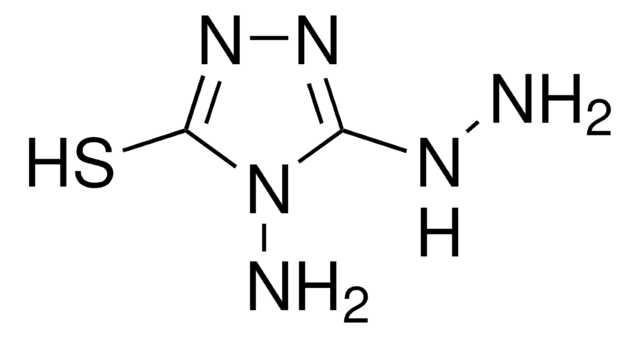K2755
2-Keto-3-Desoxyoctonat Ammoniumsalz
≥97%
Synonym(e):
3-Deoxyoctulosonic acid, KDO
About This Item
Empfohlene Produkte
Assay
≥97%
Form
powder
Lagertemp.
−20°C
SMILES String
N.OCC(O)C1OC(O)(CC(O)C1O)C(O)=O
InChI
1S/C8H14O8.H3N/c9-2-4(11)6-5(12)3(10)1-8(15,16-6)7(13)14;/h3-6,9-12,15H,1-2H2,(H,13,14);1H3
InChIKey
UDJBBKGYARWWNJ-UHFFFAOYSA-N
Suchen Sie nach ähnlichen Produkten? Aufrufen Leitfaden zum Produktvergleich
Anwendung
- Synthesis of KDO Analogues: A significant study focused on the synthesis of analogues of 3-deoxy-D-manno-octulosonic acid (KDO), which includes compounds such as 2-Keto-3-deoxyoctonate ammonium salt. These analogues were evaluated as potential inhibitors of CMP-KDO synthetase, playing a critical role in the development of new therapeutic agents targeting bacterial infections and enhancing understanding of bacterial lipopolysaccharide synthesis (Luthman et al., 1987).
Biochem./physiol. Wirkung
Lagerklassenschlüssel
11 - Combustible Solids
WGK
WGK 3
Flammpunkt (°F)
Not applicable
Flammpunkt (°C)
Not applicable
Persönliche Schutzausrüstung
Eyeshields, Gloves, type N95 (US)
Analysenzertifikate (COA)
Suchen Sie nach Analysenzertifikate (COA), indem Sie die Lot-/Chargennummer des Produkts eingeben. Lot- und Chargennummern sind auf dem Produktetikett hinter den Wörtern ‘Lot’ oder ‘Batch’ (Lot oder Charge) zu finden.
Besitzen Sie dieses Produkt bereits?
In der Dokumentenbibliothek finden Sie die Dokumentation zu den Produkten, die Sie kürzlich erworben haben.
Kunden haben sich ebenfalls angesehen
Unser Team von Wissenschaftlern verfügt über Erfahrung in allen Forschungsbereichen einschließlich Life Science, Materialwissenschaften, chemischer Synthese, Chromatographie, Analytik und vielen mehr..
Setzen Sie sich mit dem technischen Dienst in Verbindung.








